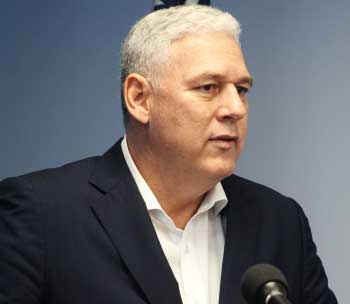SAINT LUCIA is fighting two battles that could overwhelm it if Saint Lucians do not join hands and work together to win those battles after already losing $400 – $500 million of tax revenue as a result of the COVID-19 pandemic.
This much came from Prime Minister Allen Chastanet during a television address last Sunday evening as he pleaded with Saint Lucians to take the coronavirus pandemic seriously as the latest positive case recorded in the country could result in a community spread of the disease.

Identifying COVID-19 as one of the battles the Prime Minister pointed to the economic situation facing the country as the other, underscoring the point that controlling the virus is key to effectively winning the economic battle.
“The economic impact is beyond words in terms of the job losses, the revenue losses to persons with businesses … and the great amount of uncertainty that has been created. But I’m very proud again of the plans that we have as a country in slowly reopening our international borders, gaining confidence locally that we can coexist with COVID while we open up our international borders,” Chastanet said.
He underscored Saint Lucia’s success to date in its handling of COVID-19 and how it has led to Saint Lucia being in the bubble travel market for both the United Kingdom and New York.
“It means that by taking care of business at home we have put ourselves in a substantially better position and what’s the result of that? We’ve seen flights resume. In fact just this week we’ve gotten notice from British Airways that they’re gonna commence from two flights a week to five. We’ve seen that our occupancy, our load factors on our American flights continue to grow from strength to strength. In fact one of our U.S. partner airlines is reporting a load factor of 72% from October. We’re now seeing that 80% of our hotel rooms will be opened come November 1 and many of those hotels have started rehiring persons that were employed with them previously. We’re seeing that sales locally, restaurants, bars, grocery stores, other small businesses have been picking up and that’s being reflected in the tax collection that we have as a country so the fact is that the strategy has worked and we’re slowly seeing some return to some level of normalcy,” Chastanet said.
To drive home the fact that economically Saint Lucia is still under strain Prime Minister Chastanet spoke of his government being in the middle of IMF and World Bank meetings and battling with how small island developing states were going to deal with the debt they were incurring.
“These are big numbers so when we say that we’ve lost almost 400-500 million dollars in tax revenue, I know that that’s a concept that may be very difficult for a lot of persons to understand but in essence we generate around 900 to 1.1 billion dollars a year in tax revenue. That’s money that we collect through taxes that assist us in funding government. So we have a short fall of 400 to 500 million dollars it becomes very difficult to make up that gap. And while we’ve been successful in negotiating soft loans from CDB and the World Bank and the IMF, Central Bank and from the Taiwanese government, we’re now in the process of making sure we get that money in and in the interim the government which would normally carry payables of about 20 million dollars on a monthly basis, meaning monies that we owe to other persons that number is upwards of 80-90 million dollars. That’s money that should be in circulation in our economy. But sadly it also means that many things that we take for granted the ordering of medicine, paying of utility bills, paying small bills for suppliers has become problematic and it has an impact on those individuals as well as to the public at large,” Chastanet said.
“I say all this to say that what has happened on Saturday has the clear threat of affecting what’s going on in Saint Lucia,” the Prime Minister said, referring to the case of the bus driver who was tested positive for COVID-19 and the frantic search by health authorities to locate the source of the infection and contain a community spread of the disease.














